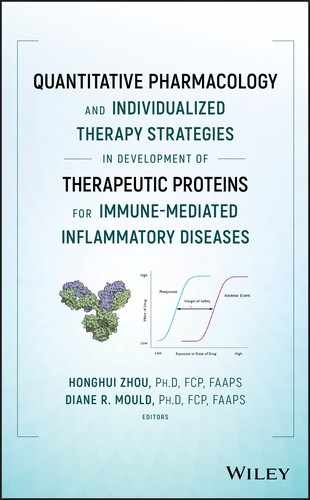Preface
Over the past two decades, protein therapeutics, and especially monoclonal antibodies, have transformed the management of autoimmune diseases and the lives of people with those diseases. For many patients, the dreadful symptoms of autoimmune arthritis, inflammatory bowel diseases, plaque psoriasis, and other diseases have been substantially alleviated and the disabling destruction of diseases such as rheumatoid arthritis have been slowed or halted. These remarkable medical advances resulted from substantial work in many scientific, medical, and engineering disciplines, including quantitative pharmacology and modeling. Far beyond the critical efforts of understanding pathophysiologic mechanisms and designing therapeutic interventions, hard‐won progress also required understanding the determinants of the pharmacokinetics and the immunogenicity of protein therapeutics, engineering molecules to optimize these characteristics, developing dosing and therapeutic regimens to exploit them, and identifying and utilizing biomarkers (e.g. c‐reactive protein) to guide development and assess effects.
Notwithstanding these remarkable successes, much remains to be done. Responses to protein therapeutics are usually less than complete, some patients do not respond at all while others have to be cycled through a variety of medicines to identify one which will help. Understanding why many individuals do not respond well and addressing the needs of those individuals is critically important. Prevention and early intervention remain largely a dream. On the safety side, avoiding the increased risks of infection and malignancy resulting from immunosuppression while still suppressing destructive autoimmune processes remains a daunting problem.
Challenging as these problems are, there is strong reason to believe that the tremendous rate of progress in the management of autoimmune disease with protein therapeutics will continue. The diversity of protein therapeutics is limitless, their potential is extraordinary, and strong pharmacologic science with interdisciplinary collaboration remains the key to realizing that potential. This book highlights many of the critical areas of research and key projects that will help ensure decades more of major advances in the management of autoimmune disease with protein therapeutics.
Jay P. Siegel
Bethesda, MD
